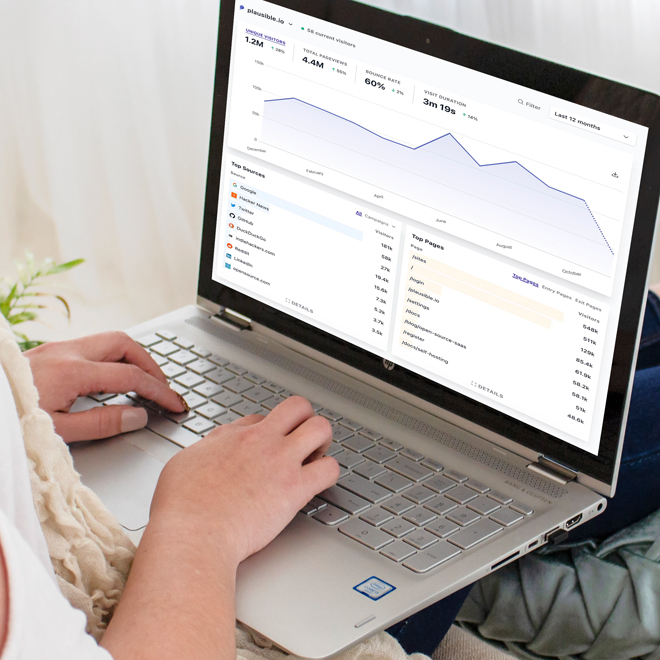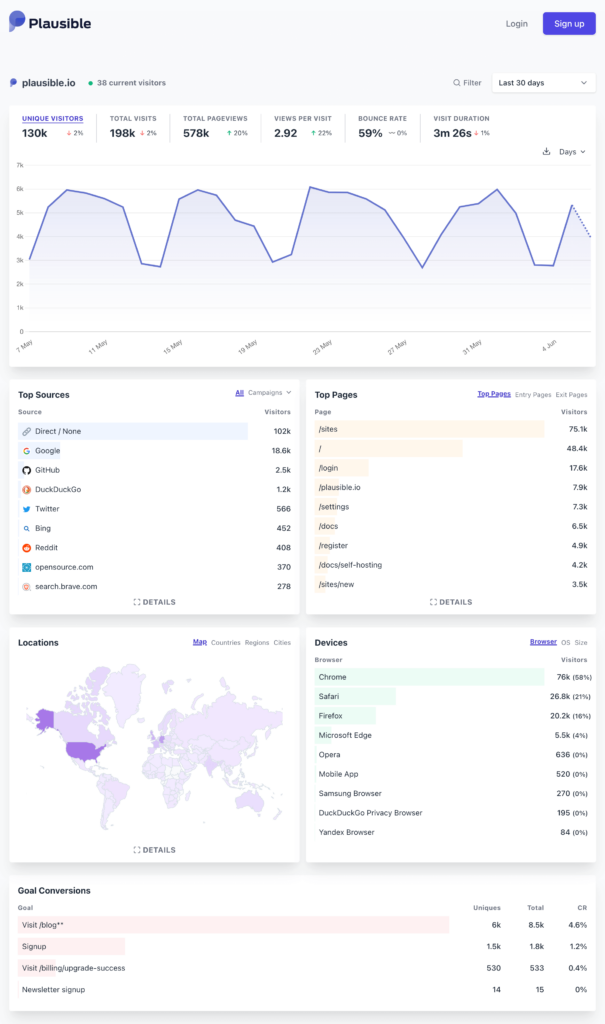SUBSCRIBE NOW
Join the Newsletter!
Entrepreneurship
Client Love
Marketing
Web Design
Email Marketing
Brand Design
Categories
Let's Connect
more about me
I help creative entrepreneurs and service providers create beautiful and effective strategic brands, websites, and email marketing programs.
owner + designer
I'm Tammy Hooker
Ciao!
Why I Use Plausible Analytics: A Google Analytics Alternative

In a previous analytics-related post, I shared why I don’t recommend Google Analytics for creative entrepreneurs and small businesses. And it boils down to three things: it has excessive amounts of data, is not intuitive, and doesn’t put privacy first.
Yet website analytics play an essential part in helping to monitor the health of your business. Though too often, they’re given a cursory (and randomly timed) scan or ignored altogether. And this is commonly due to information overload.
But there’s a better way. One that makes understanding analytics data accessible and is privacy-friendly. For me, that’s Plausible Analytics and easy-to-use, privacy-first Google Analytics alternative.
The Analytics Beast
Analytic software like Google Analytics are beasts. They simply gather way too much information for most solopreneurs and small business owners to understand – let alone act on. And mixed in with all that data is a ton of information that a) you don’t actually need and b) violates privacy regulations.
Consider these three European Union General Data Protection Regulation (GDPR) requirements:
- Contractual performance (Article 6(1)(2))
- Legitimate interests (Article 6(1)(6))
- Data subject’s consent (Article 6(1)(1))
Under these requirements, you should only collect data deemed necessary for business. And this necessity must outweigh the need for your site visitor/customer’s privacy.
Financial transactions are a perfect example of these requirements in action.
For a customer to make an online purchase, your business must collect from them not just their name and email address but also their credit card details. Without this information, you cannot provide them with the item they’re purchasing. In this instance, to complete the contractual performance your customer requests, your need outweighs their right to privacy.
But in this same transaction, your customer is providing consent. So they’re voluntarily providing you with this data to make their purchase.
This is where analytics giants like Google are pushing the limits of GDPR. They’re collecting anything they can about your website’s visitors, even if they’re just browsing your website and have no intention of making a purchase.
It’s for this reason that most websites now have that annoying cookie notice banner at the bottom of their website. To let you know that they’re tracking every move you make on the website and possibly even after you leave it.
And here’s where I have to ask, why does your business need to know how old I am, what my gender is, or the next few websites I visit if I’m not interested in what you offer?
The short answer – you don’t.
And that’s exactly why I don’t use software like Google Analytics. Software that’s crazy confusing to navigate, has too much information for me to process, and places more importance on gathering data than on my website visitor’s privacy.
The Simplicity of Plausible Analytics
When it comes to website analytics, I don’t believe in spending hours digging through troves of data to determine if my website and marketing efforts are doing their jobs. As a solopreneur, I don’t have time for that.
I need a tool that only gives me the information essential to understanding my business’s health. And that’s where Plausible Analytics comes in.
Plausible is an alternative to Google Analytics, based in the European Union (EU) and built with a privacy-first mentality. Best of all, it only collects the data I really need and none of that unnecessary stuff.
Here are five things I love about Plausible:
Simple analytics dashboard
With so much data and so many menu options in Google Analytics, it’s hard to know where to start. Not so with Plausible. They present all of the data on a single dashboard so you can see everything at a glance or at most with one or two clicks. Talk about a time saver.

Fully GDPR, PECR, and CCPA compliant
Because it’s based in the European Union (EU), Plausible is heavily focused on being and staying compliant with privacy regulations. And the EU’s GDPR is the most rigorous privacy regulation in the world, with a geographic footprint that covers 27 countries.
But that’s not all. Out-the-box, Plausible is also PECR (UK) and CCPA (California) compliant. Combined, these are the three biggest privacy regulations you need to be aware of and in compliance with.
So Plausible has you covered.
No more annoying cookie banners
Cookie banners are annoying. But necessary when you have analytics software that tracks identifiable user data with cookies.
What’s a cookie?
Cookies are tiny bits of code that are placed on your computer (stored in your internet browser) to help a website remember you. So they might contain your username and password, address, email or phone number, or remember what you had in your shopping cart. They can also be used to send you targeted ads and track if you interact with those ads.
It’s all information that has the potential to be tied back to a specific individual. And that goes against the philosophy of a privacy-first data environment.
Plausible doesn’t use cookies, meaning they don’t collect personal data. All of their data is aggregate only, meaning it’s bits and pieces that can’t be connected to anyone. And the data they do collect is only stored for a single day.
And with no cookies, there’s no need to have an annoying cookie banner on your website. That’s a win in improving your website’s user experience!
Notes: If you’re using other cookies, tags, or tracking pixels (like a Facebook pixel), you’ll still need to have a cookie banner and mention them in your Privacy Policy.
Lightweight code = better for SEO
When you add analytics to your website, you’re adding a chuck of code that has to be loaded every time a visitor loads a page of your website. The bulkier your code, the slower your website will load. And if you’re website is slow to load, visitors are quick to abandon it. And search engines don’t like that. Meaning your SEO could take a hit. Not good.
Currently, Google Analytics coding sits at around 17KB. Add in the Google Tag Manager, and you’re looking at an additional 28MB. That’s pretty beefy.
But the Plausible code is a tiny 1KB. That’s super lightweight. So your website will load faster, which is better for your SEO and your carbon footprint.
100% data ownership – download and delete
Part of the reason software like Google Analytics is free is because they turn around and sell that information to advertisers, like Google Ads. It’s how they make their money.
So, when you boil it down, you don’t own any of the data that Google collected on your behalf. They do.
Because Plausible is a paid service, they don’t need to share or sell the data they collect with anyone, like advertising companies, and therefore don’t “own it.” Instead, you own 100% of your data. And bonus, you can delete it any time if you choose.
With Plausible, your website’s data is truly for you and you alone.
When privacy is so important, shouldn’t that be how your website data is also treated?
Give privacy-first analytics a try
Plausible is by no means the only Google Analytics alternative out there. But it is the one I use on my own website and recommend most to my clients.
Yes, there’s a cost. But from where I sit, the minimal monthly fee is worth every penny when it comes to ensuring the data I collect puts privacy first. And just as importantly, I can understand and act on that data in just minutes, not hours.
View a live demo of Plausible.
As a final thought, not only do I believe in Plausible’s core data privacy philosophy and their own marketing practices (many of which I myself follow). But Plausible also makes a concerted effort to give back to environmental causes. So I feel good using it not just for my business but also from a sustainability standpoint.
let's do this!
let's build your brand a personality your customers will love!
Ready to infuse your brand with personality?
© 2025 | ZIASTORIA LLC | ALL RIGHTS RESERVED
est. 2021
contact
resources
blog
client portal
portfolio
about
Sign Up
Get my best tips, tricks, and how-tos delivered right to your inbox.
Join My Newsletter
ZiaStoria partners with creative entrepreneurs and service providers to craft brand designs, websites, and email marketing programs focused on connecting with customers and growing businesses.
Beautiful & Effective Brands
Email Marketing
Brand + Web Design
Brand Design
What can I help you with?